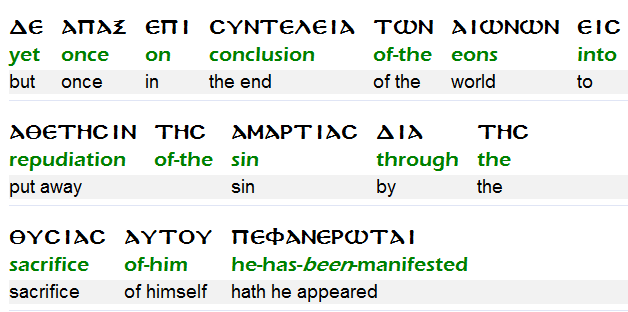
The expression "the conclusion of the eons", we encounter in Hebrews 9:26 in a rather complex sentence. When we translate this verse literally, word for word, it reads as follows:
yet now once on conclusion of the eons into repudiation of the sin through the sacrifice of Him He has been manifested.
Most translations let the words "He has been manifested" apply to the "conclusion of the eons". This produces a strange sense, because it suggests that in the past the eons, at Christ's appearance, would have ended. That can obviously not be the case, because when Christ will reign as King, in the future, He will do this "for the eons of eons" (Rev.11:15). That is to say, that after the present eon, at least two eons will follow (see also: Ephesians 2:7).
A clear picture of this verse arises only, when we relate the "end of the eons" to the "repudiation of sin." That connection is just perfect, because, when someday there will be no sin anymore and with it, death ("sin reigns in death"; Rom. 5:21) as last enemy will be abolished, then, indeed, the eons will be concluded. Christ's reign will have been completed and He will transfer a perfected Kingdom to His God and Father (1Cor.15:22-28). "Through the sacrifice of Himself" in the past (=His death and resurrection), this final result is guaranteed!
Paraphrased, Hebrews 9:26 reads:
But Christ has now once appeared, in order, at the conclusion of the eons to put away sin, by the sacrifice of Himself.
In short, Christ appeared not at, but in view of the conclusion of the eons.

first line: original text
second line: concordant rendering
third line: KJV
———————————
Translation: Peter Feddema

